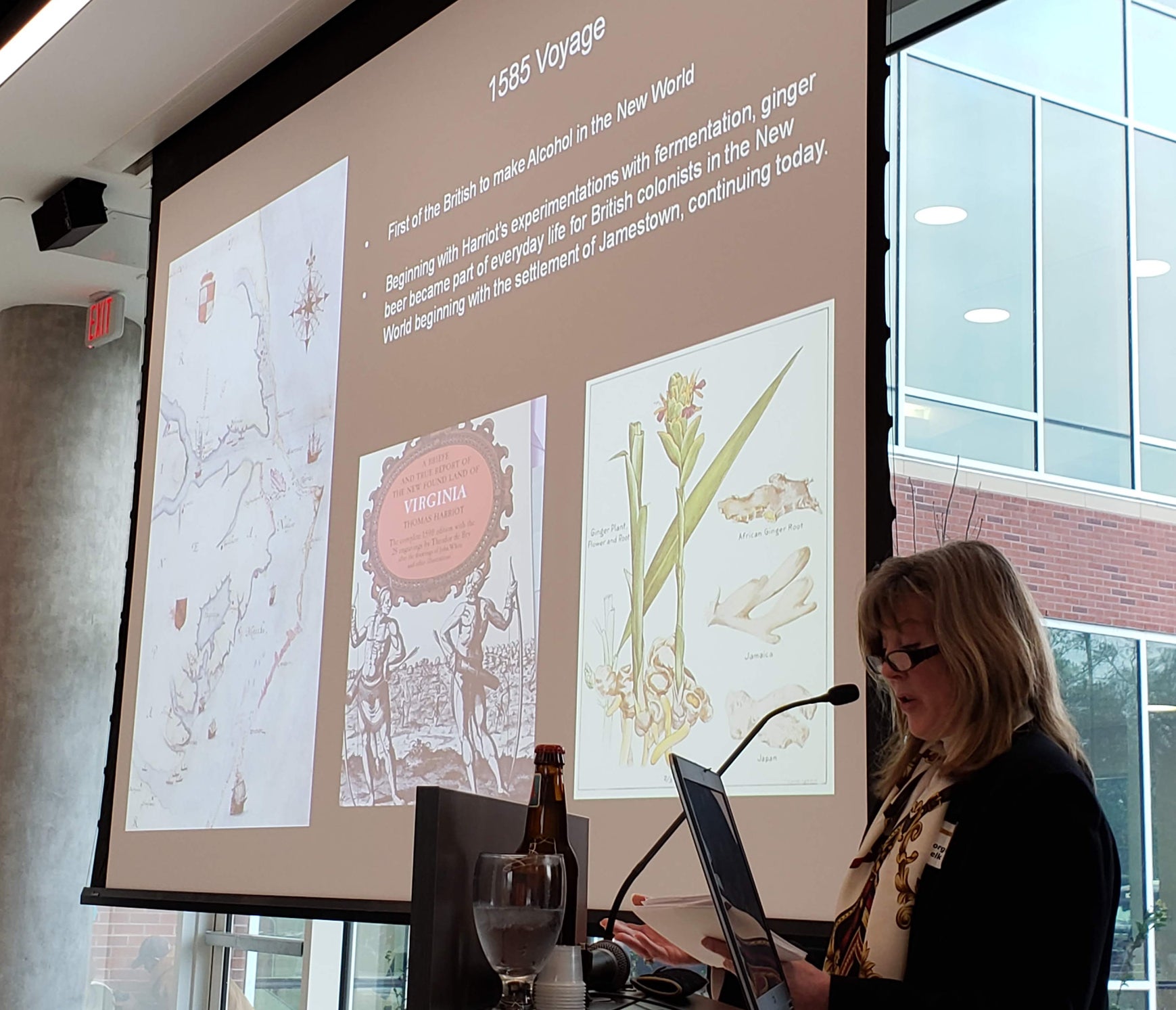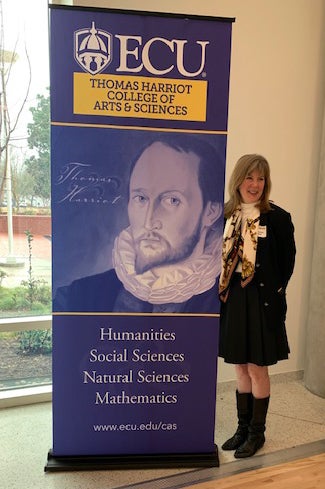Thirteenth-generation descendent of Thomas Harriot speaks with Harriot College Dean’s Advancement Council
Georgia Dunn Belk, who has traced her lineage to Thomas Harriot – the namesake of the Thomas Harriot College of Arts and Sciences at East Carolina University – spoke with the Dean’s Advancement Council at their spring meeting on Feb. 22 in the main Student Center.
Although there is no record of Harriot getting married, Dunn Belk is related to Harriot through a son born out of wedlock to Margaret Grimditch, who, in records, is said to have moved to Ireland with Harriot as “his family.”

William “Bill” Irwin Belk introduces Georgia Dunn Belk to the THCAS Advancement Council Friday, Feb. 22. Dunn Belk, a descendent of Thomas Harriot, spoke to the group about her family history. (Contributed photos)
Dunn Belk says she is part of the 13th-generation of Harriot (or Harriott) descendants and is actively involved in preserving history related to the Harriot legacy.
“Thomas Harriot played a key role in England’s ‘Age of Exploration,’ but his contributions are not contained to his advancement of math and science, nor to the service to the queen in the mid-Atlantic region of the 16th century world,” said Dunn Belk.
Harriot’s son Thomas (the younger) was among the first settlers to colonize Bermuda in the early 1600s, and with his family, eventually settled at Salt Cay Island, a small island in the southeast Turks and Caicos.
The Salt Islands – Grand Turk, Salt Cay and South Caicos – are known for their export of sea salt, an important preservative during the 17th and 18th centuries.
The Harriot family cultivated the salt trade, which continues today under the name of Morton’s Salt. Harriot’s “White House,” which Dunn Belk and her brother inherited after their father’s passing, still stands on the island and is said to be the largest remaining relic of the salt industry.
She said the Harriot family was known to produce “salt so pure you can see through it like a piece of glass.”
However, with the decline of the salt industry in the late 19th century, Dunn Belk said Salt Cay became like Colonial Williamsburg.
“It is a land that time forgot,” she said.
Later, the house was used as a setting for the 1941 movie “Bahama Passage.”
In 1585, during the exploration of the New World and Britain’s preparation for settlement of Jamestown, Virginia, Harriot (senior) took ginger from the Caribbean to Great Britain. He developed and popularized fermented ginger beer, the first of the British to make beer in the Western Hemisphere.
Dunn Belk, after learning of the connection to ginger beer, began the process of re-popularizing the local product by changing the formula to allow for greater shelf life and commercial viability. She is President and CEO of the British West Indies Trading Company Ltd., which makes the fermented low alcohol ginger beer she re-formulated under the name of Islander Ginger Beer.

Dunn Belk described how Harriot brought ginger back to Great Britain and was the first person to make beer in the New World.
She concluded her talk by re-emphasizing Harriot’s multi-faceted intellect and mentioned how important one’s family is to future generations.
“Everything that I shared with you today illustrates his [Harriot’s] keen intellect and pioneering spirt that continue to live on through the centuries. These enterprises, and the brilliant mind behind them, are also part of his enduring legacy.”
Every family has an amazing history behind it. We are all, in our own way, standing on the shoulders of giants, all of whom faced great risk, hardship and sacrifice, which made our lives possible today,” she said.
Dunn Belk is married to William “Bill” Irwin Belk, descendant of the Belk department store founder, and daughter-in-law of Irwin “Ike” and Carol Belk. The Belk name is a familiar one at ECU, found on the former Belk Residence Hall, now Gateway, and the Carol G. Belk Building.
Dunn Belk’s career has led her to positions on both the west and east coasts. She now resides in Charlotte, where she helps manage her family farm and supports open space preservation. With dual citizenship in the United States and the Turks and Caicos Islands, Dunn Belk continues to research and preserve her Harriot family story.
-by Lacey L. Gray, University Communications
